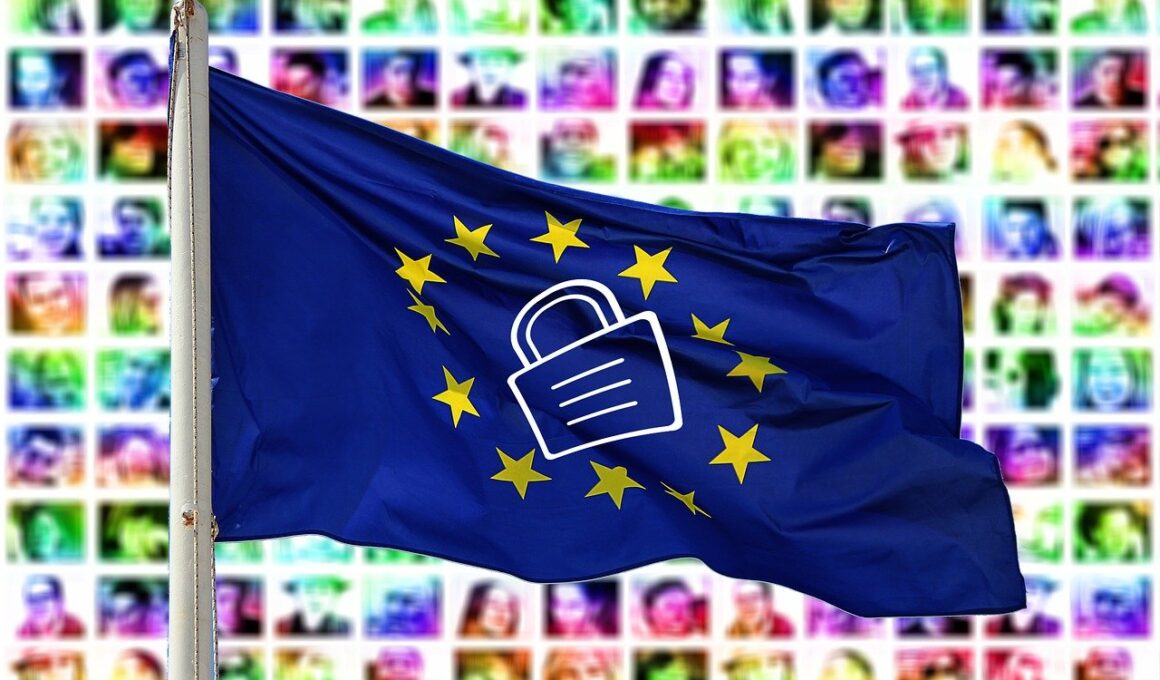Creating a Social Media Policy That Complies with Data Protection Laws
In today’s digital landscape, businesses require a comprehensive social media policy that aligns with data protection laws such as GDPR. Creating such a policy is essential for protecting sensitive information while still leveraging the advantages of social media platforms. Start by defining the scope of your policy, focusing on data collection, usage, and sharing practices. Specific guidelines reduce risks associated with data breaches and non-compliance with the law. It is vital to ensure that employees understand their roles and responsibilities, which fosters a culture of compliance throughout the organization. Including specific examples in the policy can further clarify expectations and responsibilities. Additionally, providing training sessions ensures that staff are equipped to adhere to these guidelines effectively. Regular audits can identify weaknesses in compliance, and proactive measures can be implemented before issues arise. Collaboration with a legal expert can also refine the policy while ensuring adherence to all necessary regulations. As businesses increasingly rely on digital platforms, establishing robust social media policies that prioritize data protection is paramount for sustaining public trust and reputation.
Understanding GDPR and Its Relevance
The General Data Protection Regulation (GDPR) is a key component of data protection laws in Europe, significantly impacting how organizations manage personal information. Understanding GDPR is essential for creating an effective social media policy tailored to your organization’s needs. First, ensure that the policy clearly defines what constitutes personal data, as it encompasses a broad range of information. Moreover, highlight the principles of data processing under GDPR—lawfulness, fairness, and transparency. Compliance requires organizations to inform individuals why their data is being collected, how it will be stored, and the duration of its retention. Privacy by design is a critical concept to incorporate; thus, organizations must embed data protection measures at all levels of their social media strategies. The policy should explain the rights of individuals regarding their data, including access, rectification, and the right to erasure. Create protocols for responding to data breaches promptly, as this fosters accountability. Finally, ensure that third parties with whom you share data comply with GDPR as well, emphasizing organized cooperation and risk reduction.
To facilitate compliance with data protection laws, organizations must include clear guidelines for employees who represent the company on social media platforms. Establishing these guidelines minimizes the risk posed by inadvertent sharing of sensitive information. First, outline employee responsibilities regarding content sharing and the potential ramifications of breaching these responsibilities. Provide examples of acceptable and unacceptable behavior while promoting adherence to established protocols. Moreover, introduce social media management tools that can help monitor, evaluate, and control the company’s digital footprint. Companies should also leverage educational resources to keep employees informed on best practices for online engagement. Encourage employees to think critically before posting content that could jeopardize privacy and integrity. Regularly updating the policy to reflect changes in regulations and technological advancements is also crucial. By fostering a sense of ownership among team members with regards to data protection, organizations foster a proactive approach to online safety. Ensuring employees understand the importance of security not only protects the company but builds effective strategies to mitigate risks associated with social media usage in compliance with data protection laws.
Monitoring and Enforcement
Monitoring compliance with social media policies is vital for maintaining data protection standards and encouraging adherence among employees. First, organizations should employ appropriate tools to monitor all social media channels and identify potential policy violations. Setting up clear metrics to measure compliance and effectiveness will help organizations respond proactively to issues. Conduct regular training sessions, emphasizing the importance of data protection. Consistently updating staff regarding emerging threats and compliance updates is crucial. Feedback mechanisms should also be established, allowing employees to voice their concerns or suggestions related to the policy. Furthermore, organizations must enforce disciplinary measures for non-compliance, creating a clear outline of processes that must be followed. Consistency in enforcement fosters a culture of accountability and encourages adherence to the established guidelines. Structuring the enforcement approach to be fair and supportive rather than punitive will help build trust among team members. Transparency in how violations are addressed is essential, as it keeps everyone informed and respected. Continuous monitoring and enforcement ultimately strengthen the organization’s commitment to data protection and foster a culture of compliance among employees.
As businesses increasingly rely on social media, the role of data protection should never be underestimated. Regular reviews of social media policies are essential to align with evolving regulations and technological advancements. It is advisable to evaluate legal guidelines periodically and assess potential risks posed by social media use. Collaborating with legal experts can refine policies and ensure compliance with GDPR and other data protection laws. Moreover, encouraging open dialogue within teams regarding data protection opens avenues for continuous improvement. Facilitating feedback sessions and brainstorming opportunities to develop and strengthen data protection measures is vital for creating a resilient organizational culture. Encourage employees to stay informed about current privacy trends and participate in workshops, seminars, or courses that enhance their understanding of data protection. Offering certifications or credentials can incentivize employees to channel their skills toward better compliance practices within social media environments. Ultimately, the goal should be to create a dynamic and responsive policy that adapts to and evolves with the changing digital landscape, ensuring that data protection remains a top priority for the organization throughout its operations.
Conclusion: A Commitment to Compliance
In conclusion, developing a robust social media policy that complies with data protection laws is critical for modern organizations. As social media channels grow in importance, so does the need for effective governance around data handling. Organizations must prioritize transparency and accountability in their social media practices. By establishing clear guidelines, monitoring enforcement, and facilitating ongoing training, companies strengthen their commitment to data protection. Moreover, fostering a culture of compliance ensures that employees understand their responsibilities, limiting potential risks associated with personal data handling. Regular reviews and adaptations of the policy keep the organization aligned with evolving regulations and best practices. Encouraging employee engagement through workshops or certifications cultivates an atmosphere of ownership and responsibility toward data protection. Ultimately, by prioritizing compliance, organizations can protect sensitive information, promoting trust with their audience while maximizing the benefits of social media. This commitment to compliance is not only integral to an organization’s reputation but is also a necessity in today’s increasingly privacy-focused society. Through diligence and proactive measures, organizations can effectively safeguard both their reputation and their users’ rights.
Implementing a comprehensive social media policy focused on data protection laws, such as GDPR, enhances trust and reliability in the workplace. It empowers employees to engage meaningfully while ensuring their actions align with organizational standards and legal obligations. Furthermore, embracing a collaborative approach—leveraging input from legal experts, IT, and communication teams—promotes policies that are well-rounded and effective. Organizations must remember that data protection is not a one-time initiative but a continuous commitment that evolves with societal expectations and technological changes. Therefore, fostering an internal culture of compliance through education, awareness campaigns, and open discussions is pivotal. The repercussions of non-compliance with data protection laws can include financial penalties and reputational damage; thus, cultivating proactive governance strategies is vital. By remaining flexible and adaptive, organizations can not only comply with existing regulations but also anticipate and prepare for future challenges that arise. Ultimately, a comprehensive, adaptable social media policy serves as both a framework for employee actions and a glimpse into the organization’s commitment to ethical data stewardship.
To enhance your organization’s social media policies and compliance with data protection laws, consider developing collaborative relationships with external consultants. Regular consultations with legal experts will ensure that your organization remains compliant with changes in data protection regulations. Similarly, leveraging social media audits and assessments can identify areas of improvement and help organizations stay ahead of potential risks. Additionally, ethical considerations should be reflected in the organizational culture. Ensuring that data protection and privacy remain top priorities fosters trust among customers and clients while boosting employee morale. Sharing success stories and insights on compliance practices can further encourage employees to engage positively with data protection measures. Moreover, establishing channels for employees to report concerns confidentially is essential for cultivating a safe working environment. Understanding that employees are the front line of compliance efforts will help organizations address shortcomings rapidly. Ultimately, fostering transparency and continuous improvement paves the way for developing innovative strategies that balance business objectives with data protection requirements. The alignment of social media strategies with robust data protection practices serves not only compliance needs but also enhances audience engagement and brand loyalty.


